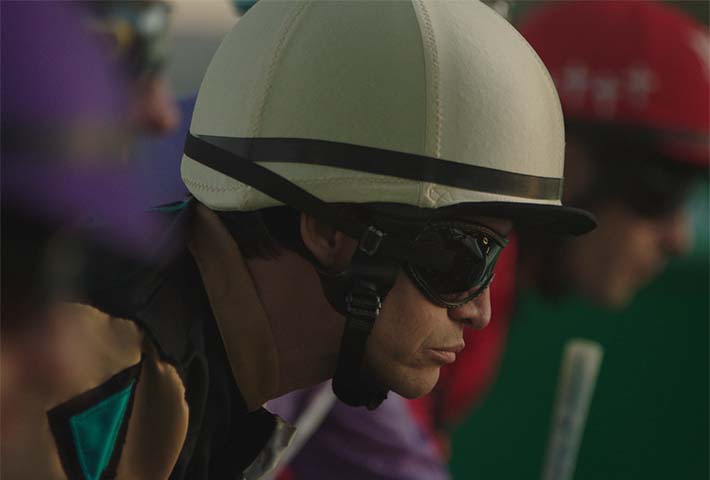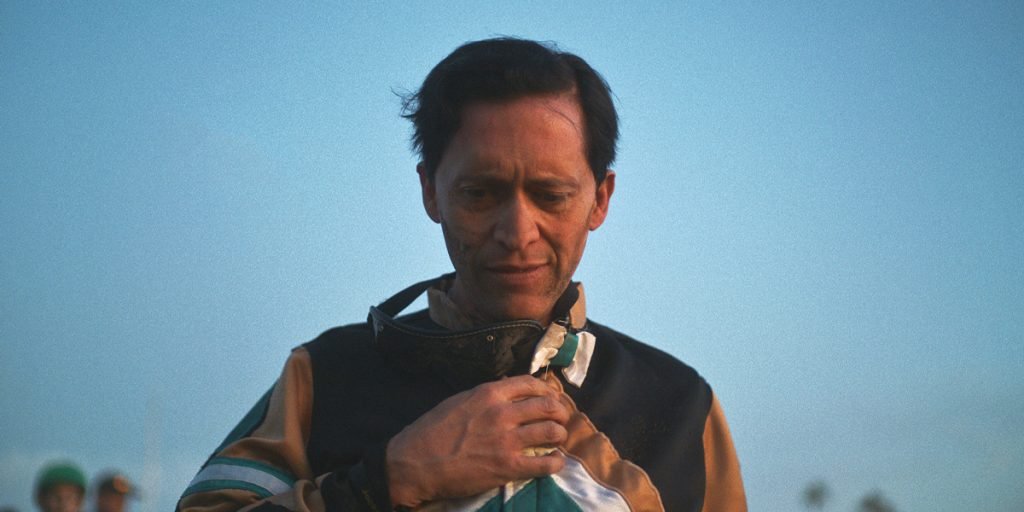Jockey hits a few familiar beats, but Clifton Collins Jr.’s captivating lead performance gives the film a raw power that’s impossible to resist.
Clifton Collins Jr. is certainly no stranger to the silver screen. From starring in the SAG-nominated and SAG-winning ensemble casts of Capote and Traffic (respectively) to taking part in bombastic blockbusters like Star Trek and Pacific Rim to playing roles in adored auteurs’ passion projects such as Quentin Tarantino’s Once Upon a Time in Hollywood and Guillermo del Toro’s upcoming Nightmare Alley, the man has absolutely made his mark on the industry, but in Clint Bentley’s Jockey, Collins finally receives a film that provides him with the show-stopping lead showcase it feels like he’s been inching towards his entire career. Even when the plot feels familiar, Collins continually elevates the moving material, grounding it with honest humanity that burrows its way deep into one’s heart, allowing us to experience his character’s emotional highs and lows right alongside him. His stark soulfulness is near-impossible to shake, and in the end, it’s undeniable that Collins has delivered one of the most poignant performances of the year.
Jockey opens near the end of professional jockey Jackson’s (Collins) career (perhaps a bit ironically, considering this may be Collins’ own career-peak). Despite breaking his back three separate times, he continues racing, wishing to win one last championship before hanging it up for good. When Ruth (Molly Parker, of Pieces of a Woman and Words on Bathroom Walls), his longtime trainer, finds a new horse she believes they can train to carry Jackson to glory, everything seems to be lining up for this prospective success. However, these plans hit a roadblock when a younger rider named Gabriel (Moisés Arias, of The King of Staten Island and Five Feet Apart) arrives, claiming to be Jackson’s son. After initially rebuking the rider’s claims, Jackson eventually warms to Gabriel, taking him under his wing and using their newfound connection as his second chance at fatherhood, while simultaneously contemplating his legacy and “what comes next” – for both himself and the rookie rider who may become his successor.
Just from that short synopsis, it’s clear that Jockey hits a few familiar beats – a once-legendary athlete at the end of rope, a man who formerly had no one who is confronted by family he didn’t even know existed and has to adapt accordingly, etc. – and Sony Pictures Classics’ own The Rider even touched on themes of an individual’s struggle to reconcile with living in the real world after losing the one thing they were good at, but this film separates itself from those similar stories by spending so much time immersing us in the specific life of Collins’ Jackson Silva. Not only is he compassionately characterized by writer-director Clint Bentley (in his directorial debut) and co-writer Greg Kwedar – with both fully fleshing out both his numerous faults and his admirable ardor for horse riding – but Collins himself takes this potentially pig-headed protagonist and infuses him with even more emotion, subverting our expectations at every turn.

Stubbornness is assuredly a central attribute of Jackson Silva – as he always believes he knows best when it comes to his riding career, butting heads Ruth on a near-daily basis and surely never taking a rookie like Gabriel seriously should he voice a concern about his health – but he’s driven by an honorable dedication to riding that truly comes to define him as a person. If he can’t ride, Jackson doesn’t know who he even is anymore, and Collins conveys that confusion and consternation in ferociously captivating fashion, affording us incredible insight into this protagonist’s psyche.
His relationships also lead us to greater realization of his personality, from his tug-of-war between respect and raucousness towards the resilient Ruth (patiently played by a phenomenal Parker) to his truly tender tie to Arias’ Gabriel and the way this “new kid” brings out Jackson’s internal fatherly instincts he’s long ignored, presenting him with a possible future that still keeps him connected to the world he knows and love even if he’s not directly involved. And, throughout all these ups and downs, Collins is constantly compelling, suffusing each scene with a sobering solemnity that complements his character’s commoving journey.
Bentley’s direction is often a thing a beauty – especially when accompanied by Adolpho Veloso’s consuming, Nomadland-esque cinematography – and it pops most during the sensationally suspenseful racing sequences, when the camera places us right in the thick of the chaos and engrosses us with the explosive energy of the event, making Jackson’s manic love for the sport all the more understandable. Aaron and Bryce Dessner (C’mon C’mon, Cyrano) also serve up a sparse but stirring score that livens up the film’s lowkey atmosphere, giving it a humanistic “hum.” But, when all is said and done, it’s apparent that Clifton Collins Jr. is by far and away the star of the show here, and it’s his complete and utter immersion into the suave Jackson Silva that makes Jockey as special as it ultimately is.
The film’s classic tropes are of course integrated into the core story in a crowdpleasing manner thanks to a strong and smart script, but its Collins who makes the material sing, and he turns in wonderfully weighty work you won’t soon be able to forget.

